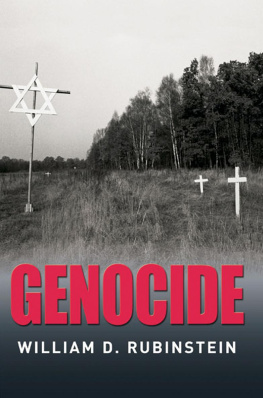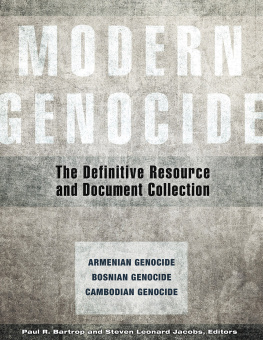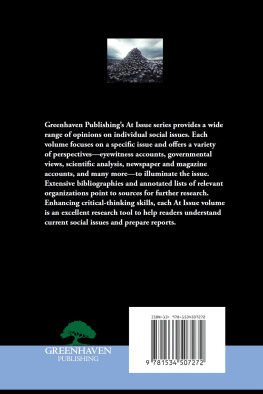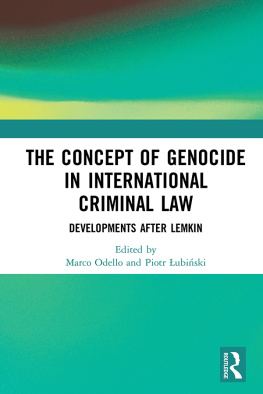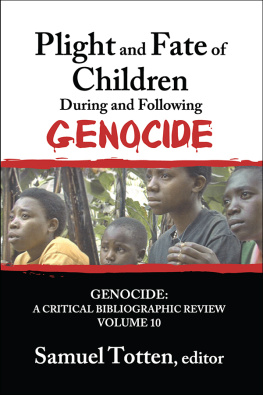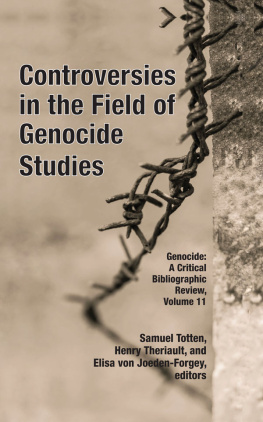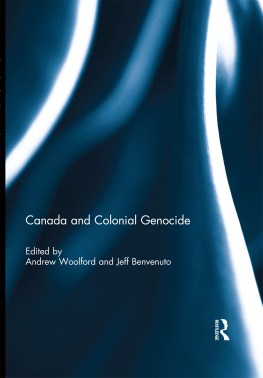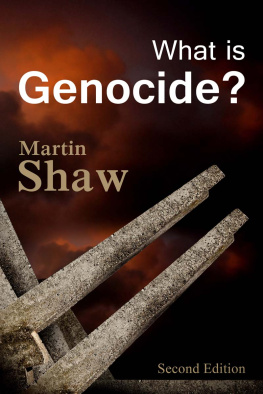Genocide
Genocide: A History
William D. Rubinstein
First published 2004 by Pearson Education Limited
Published 2014 by Routledge
2 Park Square, Milton Park, Abingdon, Oxon OX14 4RN
711 Third Avenue, New York, NY 10017, USA
Routledge is an imprint of the Taylor & Francis Group, an informa business
Copyright 2004, Taylor & Francis.
The right of William D. Rubinstein to be identified as author
of this work has been asserted by him in accordance
with the Copyright, Designs and Patents Act 1988.
All rights reserved. No part of this book may be reprinted or reproduced or utilised in any form or by any electronic, mechanical, or other means, now known or hereafter invented, including photocopying and recording, or in any information storage or retrieval system, without permission in writing from the publishers.
Notices
Knowledge and best practice in this field are constantly changing. As new research and experience broaden our understanding, changes in research methods, professional practices, or medical treatment may become necessary.
Practitioners and researchers must always rely on their own experience and knowledge in evaluating and using any information, methods, compounds, or experiments described herein. In using such information or methods they should be mindful of their own safety and the safety of others, including parties for whom they have a professional responsibility.
To the fullest extent of the law, neither the Publisher nor the authors, contributors, or editors, assume any liability for any injury and/or damage to persons or property as a matter of products liability, negligence or otherwise, or from any use or operation of any methods, products, instructions, or ideas contained in the material herein.
ISBN 13: 978-0-582-50601-5 (pbk)
British Library Cataloguing in Publication Data
A CIP catalogue record for this book can be obtained from the British Library
Library of Congress Cataloging in Publication Data
A CIP catalog record for this book can be obtained from the Library of Congress
Set by 3 in 9.5 pt Melior
To the Memory
of
Raphael Lemkin
(190059)
Acknowledgements
A number of persons commented on various parts of this work. Among them are Dr Judy Berman, Professor Albert Lindemann, Dr Philip Mendes, Barbara Rogers, Dr. Hannah Starman and Keith Windschuttle. I am most grateful to them for their helpful advice; everything here is my responsibility. I am also most grateful to Heather McCallum, my editor, for her encouragement and wisdom.
Contents
M ass murder is probably as old as the human race, but only in the twentieth century has it become so significant a part of the world scene as to become an issue of world-wide importance or, indeed, to have been given a name. (The term genocide was coined by Raphael Lemkin only in 1944.) This work is an account of mass killings throughout history which have been termed genocide, and an attempt to understand when and why they have occurred.
Perhaps the most difficult single task confronting the historian of this subject is to define the term genocide in a universally acceptable way. Despite numerous attempts during the past 30 or 40 years, there is no universally agreed definition of the term and there is never likely to be one.1 On the contrary, definitional differences at the most basic level have led to some of the most fiercely contested and ill-tempered debates in scholarly circles of recent decades, debates which have only become sharper as more and more academics and activists have joined in.
The archetypal example of genocide in modern times, on any conceivable definition, was, of course, the Nazi Holocaust of European Jewry before and, most directly and murderously, during the Second World War. Explicitly or implicitly, all debate over the meaning of genocide proceeds from the Holocaust as the central, core example. Much of the fierceness of debate over the use of the term genocide revolves around the question of whether or not the Holocaust was unique. To emphatic proponents of the view that it was, it constituted the only genuine attempt in recorded history literally to exterminate an entire people, an effort in which millions were killed in modern historys clearest example of a dedicated, purposeful death machine, and which failed in its objective only because Nazi Germany lost the war.2 To those who dissent, often passionately, from this view, the Holocaust was not only not unique, but was not a particularly extreme example of genocide, at least in terms of the numbers of its victims: according to the proponents of this view, Hitler killed far fewer European Jews than the number of Indians of North and South America who died in the century or so after European discovery in 1492, while other genocides and democides might have been just as bloody.3 The debate which has emerged on this question has become anything but academic, with such charges as those of antisemitism and the distortion of evidence being made by the fiercer proponents on either side. Moreover, given the growing importance of genocide, and the punishment of convicted war criminals, in contemporary international law and even in the active foreign policy goals of many nations and international bodies, an accepted definition of genocide has become a serious and major consideration in international affairs.
How does one reasonably define genocide? This is the most difficult question of all a surprisingly difficult and vexatious question indeed to which there is no easy or readily acceptable answer. Probably the best place to start is with a common sense definition of the sort which most well-informed persons might give if asked. Genocide might then be defined as the deliberate killing of most or all members of a collective group for the mere fact of being members of that group. Genocide is normally carried out against an ethnic or religious minority, and entails the deliberate killing of such groups of non-combatants as women, children and the elderly, who are normally seen as protected by international law or common moral custom.
This is, one might suggest, a clear and straightforward definition which, to the well-informed man or woman in the street, seems surely to embrace what is commonly meant by genocide. Yet to virtually every word in this definition scholars and historians have taken exception, often furious exception. Even so seemingly basic a requirement as that the victims of a genocide must be killed for an example of genocide to have taken place has been queried repeatedly by historians, who have viewed as genocidal the forced removal of large numbers of children from a minority ethnic group in order to raise them as members of the to this book) most acts which are construed as genocide in international law do not entail the actual killing of a group, but comprise such categories as forcibly transferring children of the group to another group and imposing measures intended to prevent births within the group. Similarly, the element of deliberate intention to kill large numbers of a group would seemingly, on our common sense definition, be an absolutely necessary requirement for genocide to have occurred, yet recent historians sympathetic to the plight of the American Indians at the hands of European settlers from 1492 onwards have repeatedly noted that while up to 95 per cent of Indians living in the Americas perished (according to those historians) over the century or so after the coming of the white man, most of this diminution in population occurred through such factors as the importation of virulent diseases previously unknown in the Americas, the destruction of settled life-styles, enslavement, and the psychological effects of conquest rather than through overt murders and slaughters, although plenty of these took place. According to these historians, however, a relatively sudden population decline of 95 per cent constitutes genocide, regardless of its origins, especially as entire tribes certainly disappeared. Some of these scholars have become involved in angry exchanges with those who argue (as many do) that the Jewish Holocaust was a unique example of genocide; given the vastly larger number of Indians who (according to them) perished after 1492, the Jewish Holocaust was not only not unique, but was not an especially large-scale example of genocide, as horrifying and evil as it obviously was.


